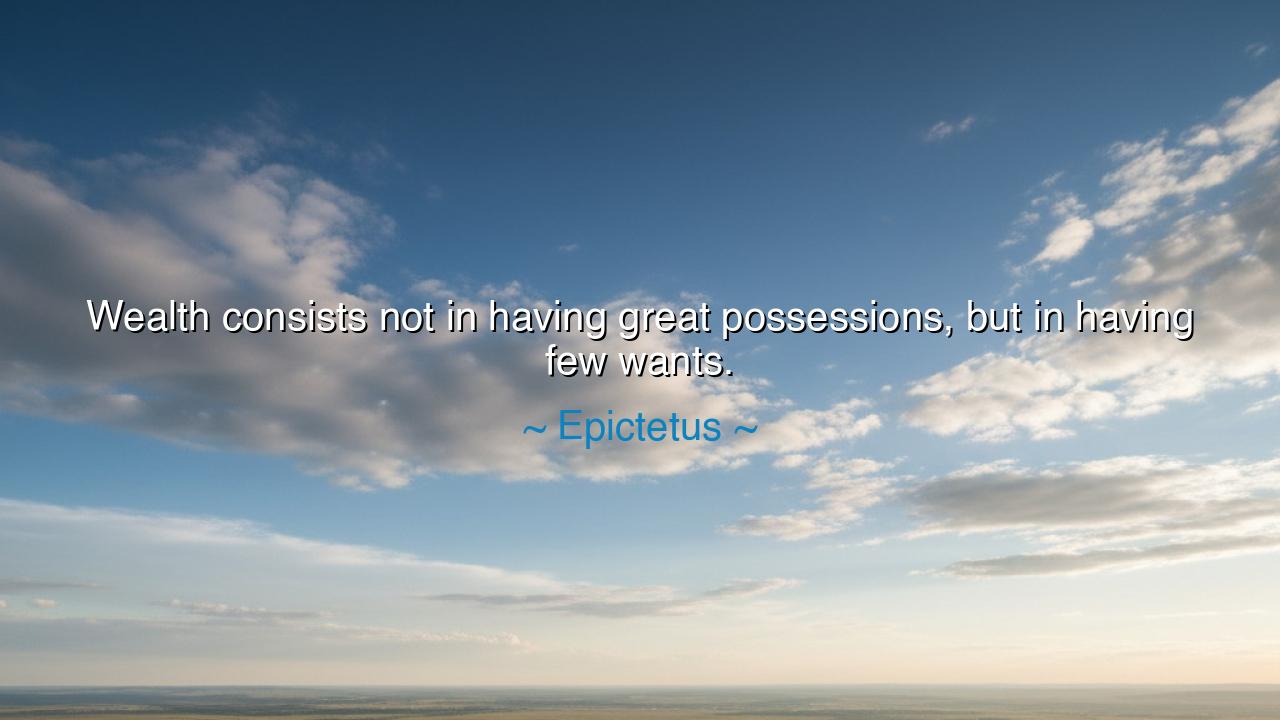
Wealth consists not in having great possessions, but in having






Hearken, O seeker of wisdom, to the voice of Epictetus, the Stoic sage whose words traverse the ages: “Wealth consists not in having great possessions, but in having few wants.” In this utterance lies a truth as profound as the stillness of the midnight sea: that the measure of riches is not found in the overflowing granaries or the glittering coin, but in the mastery of one’s desires. The ancients knew this well — that true abundance is not the accumulation of many, but the contentment of the soul with enough. Here, the essence of freedom is revealed: the freedom from craving, from endless yearning, from the chains that bind the heart to fleeting things.
In the crowded streets of Rome, the wealthy patricians flaunted their estates, their villas adorned with gold and marble, yet many of them were tormented by insatiable longing, their spirits restless despite material opulence. Epictetus, once a slave himself, understood the stark contrast between exterior wealth and inner peace. He taught that a man who can curb his wants — who finds satisfaction in simplicity, who values virtue above luxury — is far richer than emperors who command nations but remain hungry for more. The soul, when unburdened by excess desire, becomes a sanctuary of tranquility and strength.
Consider the story of Socrates, who walked barefoot among the citizens of Athens, possessing little yet commanding the awe of his contemporaries. He needed no gold nor palace to be fulfilled; his wealth lay in wisdom, in friendship, in understanding the nature of life. To him, each unnecessary want was a chain that hindered the spirit, and by shedding them, he discovered freedom unparalleled. This is the heart of Epictetus’ teaching: that great possessions cannot liberate, but few wants can elevate the human soul to heights unattainable by treasure alone.
Even in the distant past, the lives of emperors illustrate the peril of unbridled desire. Take Alexander the Great, whose conquests spanned continents, yet whose insatiable ambition left him restless even in the glory of his achievements. He had armies, cities, and wealth beyond imagination, yet his wants multiplied with his riches, leaving him spiritually impoverished. By contrast, the Stoics, and those who heeded Epictetus’ counsel, found in moderation a richness beyond the reach of conquest or coin — a sovereignty of the soul that no earthly accumulation can surpass.
In our own mortal days, the lesson resounds with clarity. In the bustling markets and roaring cities, men and women chase the glitter of possessions, often sacrificing health, honor, and peace. Yet the truly wealthy — those who possess few wants — live serenely, unshaken by fortune’s whims. They understand that to crave less is not to be deprived, but to be empowered, to walk unshackled, to find joy in the moment, and to measure life not in what one owns, but in what one truly needs.
Thus, Epictetus summons us to reflection: examine your heart, weigh your desires, and discern between need and excess. Strip away the superfluous, and discover the quiet, enduring wealth that resides within. The sage knows that each want is a tether, each craving a chain, and that liberation is achieved not through acquisition, but through contentment with sufficiency. To possess less in longing is to possess more in spirit.
The practical counsel, therefore, is clear. Cultivate simplicity in thought and action. Cherish what sustains your body and enriches your soul, but let go of the endless pursuit of more. Practice gratitude for what is present, and measure your happiness not by the abundance of your holdings but by the serenity of your mind. By living thus, you emulate the wisdom of Epictetus, becoming rich not in gold, but in peace, clarity, and freedom.
Remember, O listener: the wealth that endures is not counted in silver, land, or jewels, but in the mastery of desire itself. To have few wants is to hold a treasure that no thief can steal, a fortress that no storm can destroy, a light that illuminates the soul in every age. Let this truth guide you, and know that in simplicity lies the eternal abundance of life.






AAdministratorAdministrator
Welcome, honored guests. Please leave a comment, we will respond soon